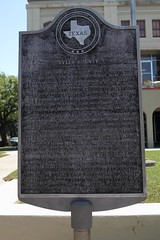John Tyler


John Tyler
(1790-1862)
10th President of the United States (1841-1845)
Commemorated on 3 plaques
Texas Historical Marker #07762
City of Tyler. In area opened 1839 to white settlers by Republic of Texas victories over Cherokee Indians whose trails led the way to good springs, fine farmlands, useful salines. The first Legislature of the state of Texas named the town (founded 1846) for President John Tyler, who signed the resolution annexing Texas to the United States. Originally a farm market, Tyler in early years had few men of wealth, but by 1860 was known for good schools, churches and cultured citizens. Several men here raised and commanded troops in Civil War. After mid-1863 this was transportation headquarters for Trans-Mississippi Department of the Confederacy. It had an ordnance factory and was site of Camp Ford -- the largest P.O.W. post west of the Mississippi. In 1870s important as site of railroad shops and roundhouse. Developed industries, manufacturing, fruit and vegetable packing, shipping, expanding economy. Furnished Texas with statesmen, including Governors Richard B. Hubbard (in office 1876-1879), O. M. Roberts (1879-1883) and James Stephen Hogg (1891-1895). Upon discovery of nearby East Texas oil field in 1931, became investment, banking, servicing center. Home of Tyler Junior College; Annual Rose Festival. #7762
Courthouse lawn, Broadway at W. Erwin St., Tyler, TX, United States where they is commemorated
Texas Historical Marker #11458
Tyler County. (Crossroads to East Texas) Home ground of civilized tribes of Indians. Visited 1756 by Spanish explorers, who were trying to keep French trading expeditions out of Texas. Site in 1831 of Fort Teran, commanded by Colonel ellis Peter Bean, famous and colorful adventurer. The county was created an organized in 1846. It was named for President John Tyler, who signed the resolution to annex Texas to the United States. A 200-acre plot for a county seat was donated by a leading early settler, Josiah Wheat. It was named "Woodville" for George T. Wood, sponsor of the bill in the First Legislature of Texas which created the county. (Wood later served as Governor of Texas, from 1847 to 1849.) In the "Big Thicket." Home of the annual Dogwood Festival. Economy is based on timber, oil, livestock. First county officials: William P. Sansour, chief justice; Ezekiel Green, George Kirkwood, Angelina Parker, Ivy Taylor, commissioners; James Sapp, sheriff; James Barclay, tax assessor and collector; J. Dobb and William Gray, justices of the peace; Harmon Frazier, surveyor; John C. Arnett, treasurer. 1966 county officials: Jeff R. Mooney, county judge; Joe I. Best, F. C. Hicks, Leon Fowler, H. H. Powell, commissioners; J. F. Boyd, treasurer; Tom Sawyer, county clerk; A. L. Thornton, tax assessor & collector; Clyde E. Smith, Jr., county attorney; Grady Ray, sheriff; B. M. Minter, county school superintendent; Hilda Coats, district clerk; Joe H. Loggins, E. E. Sheffield, Clarence Woodrome, L. L. Parrish, justices of the peace. #11458
?, Woodville, TX, United States where they is commemorated
Presidential Convention. The Whig Convention of Dec. 1839 met in this church and nominated Wm. Henry Harrison for president, John Tyler for vice-president. Popularized as "Tippecanoe and Tyler Too," they were elected, 1840.
15 S. 4th St. at Zion Lutheran Church, Harrisburg, PA, United States where they was


